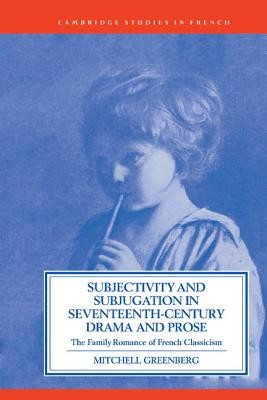
- We will send in 10–14 business days.
- Author: Mitchell Greenberg
- Publisher: Cambridge University Press
- ISBN-10: 0521412935
- ISBN-13: 9780521412933
- Format: 14 x 21.6 x 1.9 cm, hardcover
- Language: English
- SAVE -10% with code: EXTRA
Subjectivity and Subjugation in Seventeenth-Century Drama and Prose (e-book) (used book) | bookbook.eu
Reviews
Description
This book analyzes the relationship between an emergent modern subjectivity in seventeenth-century French literature, particularly in dramatic works, and the contemporaneous evolution of the absolutist state. It shows how major writers of the Classical period (Corneille, Racine, Moliere, Lafayette) elaborate a new subject in and through their representations of the family, and argues that the family serves as the mediating locus of a patriarchal ideology of sexual and political containment. Professor Greenberg argues that this reflects the conflicting social, political and economic forces that were shifting European society away from the universe of the Renaissance and guiding it toward the "transparency" of Classical representation.
EXTRA 10 % discount with code: EXTRA
The promotion ends in 18d.18:22:11
The discount code is valid when purchasing from 10 €. Discounts do not stack.
- Author: Mitchell Greenberg
- Publisher: Cambridge University Press
- ISBN-10: 0521412935
- ISBN-13: 9780521412933
- Format: 14 x 21.6 x 1.9 cm, hardcover
- Language: English English
This book analyzes the relationship between an emergent modern subjectivity in seventeenth-century French literature, particularly in dramatic works, and the contemporaneous evolution of the absolutist state. It shows how major writers of the Classical period (Corneille, Racine, Moliere, Lafayette) elaborate a new subject in and through their representations of the family, and argues that the family serves as the mediating locus of a patriarchal ideology of sexual and political containment. Professor Greenberg argues that this reflects the conflicting social, political and economic forces that were shifting European society away from the universe of the Renaissance and guiding it toward the "transparency" of Classical representation.


Reviews